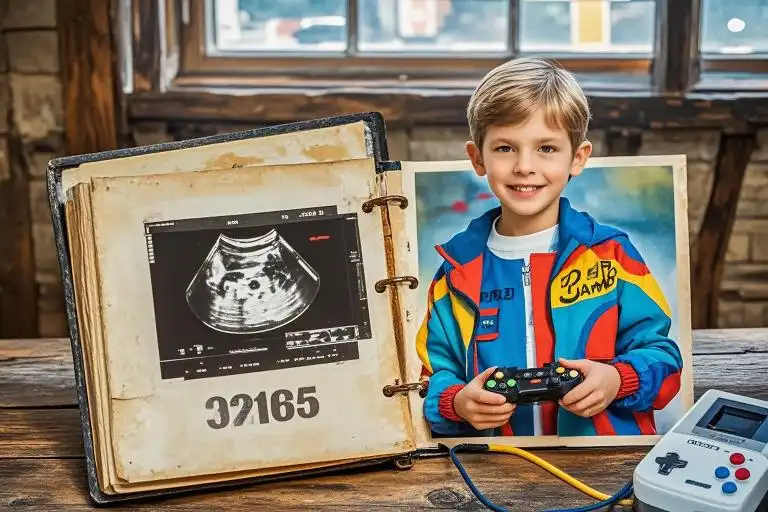Our family photo albums tell a story of time travel. There’s my eldest brother in his 1960s crew cut holding a transistor radio, my sister posing with 1978 roller skates, and me—a scrawny kid in neon windbreakers clutching a Nintendo controller. We seven siblings span three generations like human time capsules, our birth years (1946 to 1969) mapping onto postwar optimism, Woodstock rebellions, and the cynical glow of MTV’s golden era.
The Ghost in the Family Portrait
The summer I turned forty-five, I found myself staring at a black-and-white ultrasound photo tucked behind my parents’ wedding portrait. “Sam,” the faded pencil note read. “June 1965.” Two years my senior had he survived the birth. My phantom brother.
I imagine us as mirror images during that traumatic summer of 1978 when our family traded suburban sidewalks for chicken coops. At nine years old, I cried into my Walkman headphones during the move to the hobby farm. Sam would’ve been eleven—old enough to pretend he didn’t care about leaving friends, but young enough that his voice still cracked when arguing about who’d get the bigger bedroom.
“We could’ve built tree forts together,” my sister recently mused, stirring sugar into her coffee with the same absentmotion Mom used when recounting the stillbirth. “You wouldn’t have been… you know.” She didn’t say “the accident” or “the afterthought,” but I heard it in the clink of her spoon.
Cultural Castaways
Our dinner table conversations unfolded like PBS documentary marathons:
- Silent Generation brothers debated Vietnam War draft strategies over meatloaf
- Boomer sisters rehashed Beatles vs. Stones debates while scrubbing casserole dishes
- Me (Gen X) tried explaining why “Bill & Ted’s Excellent Adventure” mattered
They wore their historical moments like military ribbons—Watergate protests, disco fever, the moon landing. My cultural references (Atari games, latchkey kid independence, Chernobyl anxiety) felt flimsy by comparison.
I once asked my brother Tom (23 years my senior) to help with a school project about the 1950s. “Shouldn’t you interview someone who’s actually lived through it?” he joked, unaware he’d summarized my entire childhood.
The Unspoken Hierarchy
Family reunions operated on generational zoning:
- Front porch: Retired siblings discussing Medicare plans
- Backyard: Middle-aged siblings comparing college tuition costs
- Basement: Me and the nephews playing Dungeons & Dragons
Only during the annual talent show did we bridge the decades—my nieces performing TikTok dances to my brother’s harmonica rendition of “Puff the Magic Dragon.”
Parallel Childhoods
When my memoir about 90s pop culture was published, my siblings reacted with puzzled pride. “It’s like you grew up in another country,” my sister remarked, flipping pages filled with references to grunge music and mall arcades.
But Sam would’ve known. He’d have:
- Shared my Mortal Kombat obsession
- Understood why getting left at the mall felt apocalyptic
- Rolled his eyes when Mom called Nirvana “noise pollution”
We might’ve even forged a secret language—part Gen X slang, part invented sibling shorthand. Instead, I became fluent in translating between generational dialects.
The Parent Paradox
Only when holding my own newborn did I grasp the quiet tragedy of my parents’ choice. Their decision to wait until their eldest launched into adulthood before having me wasn’t just practical—it was generational.
“Children adapt,” Dad always said when I complained about moving schools. But in 1978, parenting manuals didn’t discuss emotional whiplash. They measured success by full lunchboxes and intact bicycle helmets.
Mom recently confessed: “We thought giving you older siblings meant you’d never be lonely.” Her voice caught on “thought,” that fragile bridge between intention and outcome.
Ghost Brother, Real Legacy
Sam’s absence shaped me more than any living relative. He taught me:
- Grief can be inherited (I mourned someone I never met)
- Silence leaves room for stories (I became a writer to fill voids)
- Generational gaps are bridges, not barriers (I now host podcast interviews between Boomers and Gen Zers)
Last Christmas, my nephew (born 2004) asked why I collect vintage Pac-Man machines. “They remind me of the 80s,” I started explaining, then paused. “Actually, they remind me of what Sam might’ve loved.”
He nodded solemnly, scrolling through his phone. A minute later, he showed me a TikTok video of teens playing retro arcade games. “Sam would’ve been awesome at this,” he declared.
In that moment, our family’s fractured timeline finally synced.





